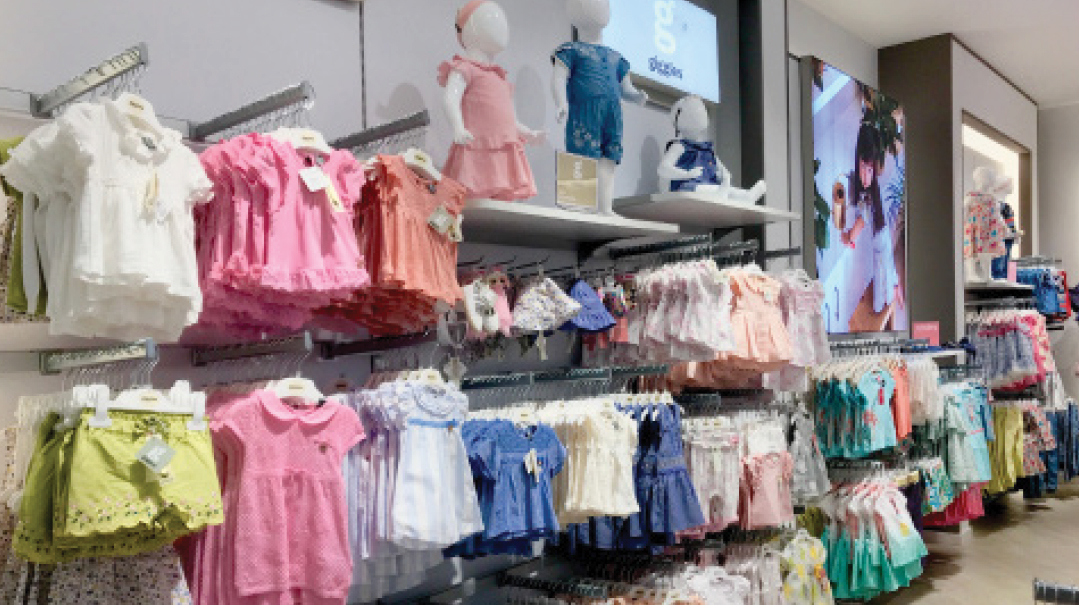To the Lady in the Store

It’s walking through the sea while G-d turns the world upside down, it’s shaking in awe of His power to upend the natural order and create a nation

Through the glass window of the dress shop, I spot a huge bottle of hand sanitizer sitting on a barstool like a stately sentinel.
“Sign your name on the paper.” The saleslady wears a mask and gloves. “The wait is 20 minutes and then you get 20 minutes in the store.” I nod, measure the distance between me and the customer in front of me. Last week I hated the crowds, now I hate the separation, the wariness and unease that settles like a fine layer of mold in the spaces between us.
It’s one of those days at the beginning, but not the very beginning. School’s been canceled but we’re not on lockdown yet. We know things are going to get worse but our brains are still toying with what sort of legwear will go best with the toddlers’ Pesach dresses. The sequined socks are driftwood — and I’m holding on for dear life.
The owner comes by and glances at the older woman next to me speaking on the phone in rapid-fire Hebrew. “Don’t let her in,” she whispers to the masked sentry. “Find out what she needs and bring it out to her, it’s not safe for her to come inside.”
I want to cry because sometimes love looks cruel.
A police officer comes by, inspecting, making sure there’s no more than ten people inside. The two seminary girls waiting in line with me whip out their cameras, snap, giggle. “We’re hoping to come back after Pesach,” they tell me. I nod and smile. I want to cry for them too.
I’m here for a dress that covers the knees of my daughter who grew approximately 4,000 inches in the past six months. At least, that’s what I tell myself. But I’m not gonna lie, there’s some dark, deep-rooted habit here. This time of year I usually dive right in to the floral print, eyelet, lacy teals, ribbed sets, light grays, nude stockings, spring. I obsess over every detail and I say it’s for Pesach because kavod Yom Tov and all that, but also, I love it. There. I said it.
And then you walk up, while I’m still blinking back tears because the owner won’t let the old lady in and the seminary girls are still in denial, and I want to buy every single thing in the store just to decompress, but I’m here for a dress that covers the knees of my growing daughter. I can justify standing here for tzniyus, but not indulgence.
“You’re right after me,” I say, and you quickly write your name on the sheet.
All the pretty, frilly things I don’t need beckon through the window and maybe I’m pretending this unbearably dark cloud is about store closures and lines and waiting on the sidewalk instead of gasping for breath and pneumonia and failing lungs. Maybe it’s still early enough to make-believe this will be an inconvenience and not a tragedy. A few people walk out.
“Rachael Lavon,” the masked saleswoman calls out.
I go in and you follow.
“Rachael Lavon?” You turn to me. “You sound like the writer.” It’s a statement and a question.
I’m embarrassed because I look the way a mom who’s been failing at homeschooling for a week looks and I’m distracted because I’m finally inside and the ankle-length, tiered lines of shimmery color, brushstrokes on silky—
“I am the writer.” I smile. Actually, that’s a lie. I don’t think I smile. Usually I would because, goodness, someone out there read something I wrote and actually liked it enough to remember my name.
Usually I wouldn’t just smile, I’d beam and offer to babysit your children or do your laundry as a token of appreciation, but the world is dark today and I feel grief for things that haven’t even happened yet, and maybe I come off as rude but really I’m just drowning in my own turmoil, so I grasp at dresses, run my hand down the seams, turn away.
“I love your writing,” you say.
“Thank you so much,” I reply. Below the knee in black with buttons up the side, light blue pinstripes gathered in the middle, printed, pleated—
“Will you write a story about this?”
And that makes me stop. I let go of the A-line midi-length knit and look at you. You’re wearing lipstick, your sheitel looks brushed. You look like you have it together, like the world is falling apart but somehow you’re okay. Maybe I envy you just a little.
“A story?” I hadn’t even thought of writing about all this, even though that’s what we writers do. “I can’t write a story about this. It’s too real.” It’s an awkward knee-jerk reaction to a pretty sensible question, but I’m thinking fiction and this plot is far too out there to be approved by the editor. Too sci-fi, end-of-the-world, dystopian. Too unrealistic.
You nod. I submerge myself in fabric.
“If you’d written a story about all this a month ago no one would have believed it.”
And that’s the line that stays with me. After I find the dress, leave the store, sanitize in the car, and make my way home. That’s the line that stays because it holds the inherent reality that truth really is stranger than fiction. If I’d written a story in November about a pandemic that sweeps the globe and the madness that ensues, it would have been deemed too far-fetched for print.
But here’s the thing, lady in the store near Shefa who I don’t know and may never see again — you made me think long and hard about stories. It’s the real ones that are the most unbelievable, that become the center point of our lives, and this one — the one we’re living now, has already been told. I don’t need to write it; it’s older and bigger and greater than all of us.
It’s a plague that ravaged the land and toppled the economy, it’s the people who died and the people who lived. It’s the end and the beginning, it’s walking through the sea while G-d turns the world upside down, it’s shaking in awe of His power to upend the natural order and create a nation. And maybe that story resonates a bit more right now.
Once there was plague and now there is plague, only this time it’s ripped me from the net I get caught up in every year before Pesach. It’s brought me back to the core of my own story.
It’s not about what I’m wearing when I tell the story, not where I am, it’s not who I’m with, and it’s definitely not about the toddlers’ socks. It’s about telling the story in all its extraordinary details, relating G-d’s greatness and kingship and glory like we do every year. Only this year we’ll do it as a nation. Alone. Together. It’s the same, but goodness, it feels different.
We are walking through the sea, lady in the store, mom who’s locked herself in the bathroom for some quiet time, the coughing and feverish kids bouncing off the walls, family members sitting at home while their loved ones battle this disease alone, brides who waited decades for this moment, bar mitzvah boys who spent months practicing their leining, newborn babies who won’t meet their grandparents for a long time, the deceased buried with just a minyan when you deserve all of Klal Yisrael to bid you farewell.
We’re all walking through the sea. In our own separate lanes, together.
One day, we’ll get to the other side and we’ll marvel at His greatness. I know this because the same G-d Who closed down the Pesach hotels, Who drained the bank accounts and forced families to spend Yom Tov apart, Who has us digging into reserves we didn’t even know we possessed — it is He Who redeemed us and gave us the reason to celebrate in the first place. It is He Who will lift us past the pain and grief and He Who will give us a reason to celebrate in the future.
(Originally featured in Family First, Issue 688)
Oops! We could not locate your form.












